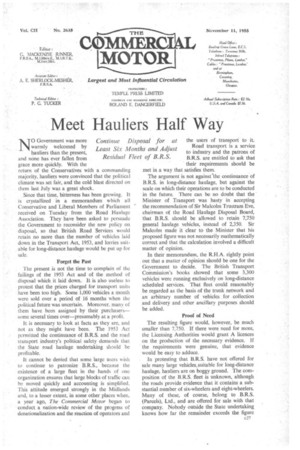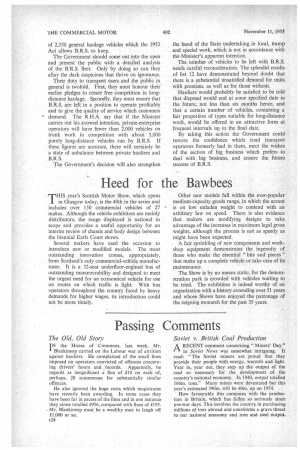Meet Hauliers Half Way Continue Disposal for at Least Six
Page 93

Page 94

If you've noticed an error in this article please click here to report it so we can fix it.
Months and Adjust Residual Fleet of B.R.S. NO Government was more warmly Welcomed by hauliers than the present, and mine has ever fallen from grace more quickly. With the return of the Conservatives with a commanding majority, hauliers were convinced that the political climate was set fair, and the cold blast directed on them last July was a great shock.
Since that time, bitterness has been growing. It is crystallized in a memorandum which all Conservative and Liberal Members of Parliament received on Tuesday from the Road Haulage Association. They have been asked to persuade the Government to reconsider the new policy on disposal, so that British Road Services would retain no more than the number of vehicles laid down in the Transport Act, 1953, and lorries suit. able for long-distance haulage would be put up for sale.
Forget the Past The present is not the time to complain of the failings of the 1953 Act and of the method of disposal which it laid down. It is also useless to • protest that the prices charged for transport units have been too high. Some 1,000 vehicles a month were sold over a period of 16 months when the political future was uncertain. Moreover, many of them have been assigned by their purchasers— some several times over—presumably at a profit.
It is necessary to look at facts as they are, and not as they might have been. The 1953 Act permitted the continuance of B.R.S. and the road transport industry's political safety demands that the State road haulage undertaking should be profitable.
It cannot be denied that some large users wish to continue to patronize B.R.S., because the existence of a large fleet in the hands of one organization ensures that large blocks of traffic can be moved quickly and accounting is simplified.
This attitude emerged strongly in the Midlands and, to a lesser extent, in some other places when, a year ago, The Commercial Motor began to conduct a nation-wide review of the progress of denationalization and the reaction of operators and the users of transport to it.
Road transport is a service to industry and the patrons of B.R.S. are entitled to ask that their requirements should be met in a way that satisfies them.
The argument is not against the continuance of B.R.S. in long-distance haulage, but against the scale on which their operations are to be conducted in the future. There can be no doubt that the Minister of Transport was hasty in accepting the recommendation of Sir Malcolm Trustram Eve, chairman of the Road Haulage Disposal Board, that B.R.S. should be allowed to retain 7,750 general haulage vehicles, instead of 2,350. Sir Malcolm made it clear to the Minister that his proposed figure was not necessarily mathematically correct and that the calculation involved a difficult matter of opinion.
In their memorandum, the R.H.A. rightly point Out that a matter of opinion should be one for the Government to decide. The British Transport Commission's books showed that some 3,300 vehicles were running exclusively on long-distance scheduled services. That fleet could reasonably be regarded as the basis of the trunk network and an arbitrary number of vehicles for collection and delivery and other ancillary purposes should be added.
Proof of Need The resulting figure would, however, be much smaller than 7,750. If there were need for more, the Licensing Authorities would grant A licences on the production of the necessary evidence. If the requirements were genuine, that evidence would be easy to adduce.
In protesting that B.R.S. have not offered for sale many large vehicles.suitable for long-distance haulage, hauliers are on boggy ground. The composition of the B.R.S. fleet is unknown, although the roads provide evidence that it contains a substantial number of six-wheelers and eight-wheelers. Many of these, of course, belong to B.R.S. (Parcels), Ltd., and are offered for sale with that company. Nobody outside the State undertaking knows how far the remainder exceeds the figure of 2,350 general haulage vehicles which the 1953 Act allows B.R.S. to keep.
The Government should come out into the open and present the pablic with a detailed analysis of the B.R.S. fleet. Only by doing so can, they allay the dark suspicions that thrive on ignorance.
• Their duty to transport users and the public in general is twofold. First, they must honour their earlier pledges to create free competition in longdistance haulage. Secondly, they must ensure that B.R.S. are left in a position to operate profitably and to give the quality of service which customers • demand. The R.H.A. say that if the Minister carries out his avowed intention, private-enterprise operators will have fewer than 2,000 vehicles on trunk work in competition with about 5,000 purely long-distance vehicles run by B.R.S. If these figures are accurate, there will certainly be a state of unbalance between private hauliers and B.R.S.
The Government's decision will also strengthen the hand of the State undertaking in local, tramp and special work, which is not in accordance with the Minister's apparent intention.
The number of vehicles to be left with B.R.S. needs careful reconsideration. The splendid results of list 12 have demonstrated beyond doubt that there is a substantial unsatisfied demand for units with premises, as well as for those without.
Hauliers would probably be satisfied to be told that disposal would end at some specified date in the future, not less than six months hence, and that .a certain number of vehicles, containing a fair proportion of types suitable for long-distance work, would be offered in an attractive form at frequent intervals up to the final date.
By taking this action the Government could restore the confidence which road transport operators formerly had in them, meet the wishes of the section of big business which prefers to deal with big business, and ensure the future success of B.R.S.
































































































































































































































































































